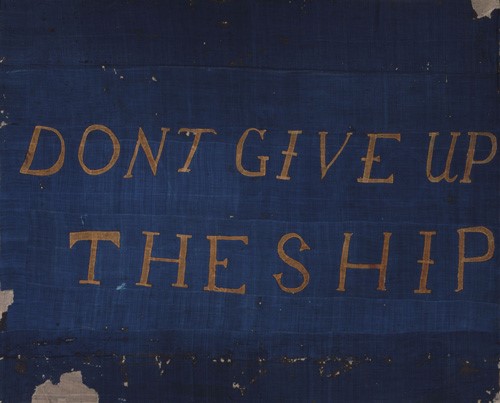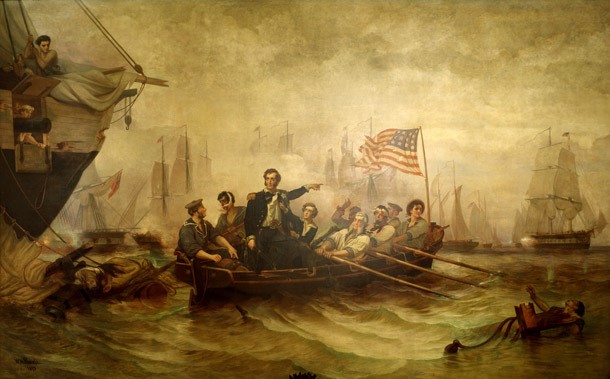
There are many famous phrases and sayings in American military history that were commonly used and repeated in conversation. Many are lost to most Americans, but several actually have Erie roots.
Possibly the best known, due to the popularity of the U.S Brig Niagara, a common sight on Erie’s bayfront and sailing the lake is “Don’t Give Up The Ship.” What many do not know is that the phrase was actually uttered by another. On June 1, 1813, the US frigate Chesapeake engaged the British ship HMS Shannon off Boston. Shannon fired first and Chesapeake’s captain James Lawrence was mortally wounded in the fighting. As Lawrence lay badly wounded, he said to those near him, “Don’t Give Up The Ship, fight her ‘til she sinks.” This would become, in part, Oliver Hazard Perry’s battle flag flown from his flagship Lawrence and later Niagara at the Battle of Lake Erie on September 10, 1813. Today the banner, sewn by two Erie women, hangs at the U.S. Naval Academy, Annapolis, Maryland.
But even a phrase as venerable as “Don’t Give Up The Ship” has morphed into “Don’t Give Up The Sip” on coffee mugs sold by a local store specializing in Erie items.
Another famous naval phrase with and Erie connection is “We have met the enemy, and they are ours…” Written by Perry after the Battle of Lake Erie to the land commander Gen. William Henry Harrison informing him of his victory over the British. The full message, hurriedly written down by Perry reads “Dear Gen’l: We have met the enemy and they are ours. Two ships, two brigs, one schooner and one sloop. Yours with great respect and esteem, O.H. Perry.”
This phrase was altered in the 1970s to “We have met the enemy he is us.” It was first used on a poster to promote Earth Day in 1970. Cartoonist Walt Kelly later used the phrase in put into a comic strip and attributed the phrase to Pogo, one of the characters.


During the Spanish-American War in 1898, anther famous naval phrase was spoken to a navy officer who had made Erie his home. On May 1, 1898, an American squadron under the command of Commodore George Dewey entered Manila Bay in the Spanish-held Philippines to engage the enemy squadron then at anchor there. Dewey’s flagship was the USS Olympia commanded by Captain Charles V. Gridley of Erie. At 5:30 AM, Dewey told the captain “You may fire when ready, Gridley.” The Battle of Manila Bay was a lopsided American victory in a one-sided war that led to the United States stepping onto the world stage as a major power. Gridley died not long after the battle of natural causes and is buried in Erie’s Lakeside Cemetery.


So the next time you feel the urge to say something profound when someone is about to begin a venture, try saying “You may fire when ready.” It was good enough for Daffy Duck, after all. Of course, audiences in 1953 knew what he was talking about.

